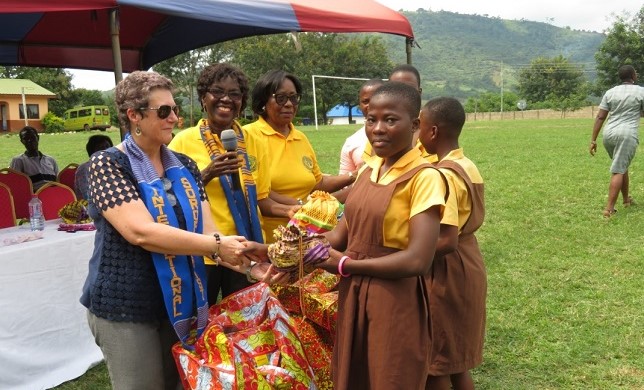All things being normal in the female reproductive system, one of the things that every growing up girl will experience is menstruation. And yet for most girls and women, menstruation is a big issue, because of the associated shame, stigma and misinformation.

According to a report commissioned by the United Nations Population Fund (UNFPA), shame, stigma and misinformation surrounding menstruation are contributing to serious human rights concerns for women and girls. The report notes that as a result of menstruation women and girls face stigma and ridicule that contribute to their exclusion from school and opportunities.
So, this very normal aspect of the life of females, is facing challenges such as lack of products, disposal facilities and being restricted from activities. Thus, women who are most of the world’s population are being disadvantaged by their menstrual cycles in what is now known as “period poverty.”
In Ghana, period poverty is said to be affecting some school going girl-children. For instance, in the Akwapim South District of the Eastern Region, about 450 girl-children in Junior High Schools, are said to be affected by period poverty.
The Reusable Pad initiative
Sometime in 2018, when the ladies of Soroptimist International Club of Accra, learnt of the situation, they became alarmed. Members were shocked to learn that the schooling of the young girls was being compromised, because they lacked appropriate information about the changes taking place in their bodies during that stage in their lives and therefore could not properly handle what they were going through.
Consequently, upon formal request from the Education Directorate of the Akwapim South District Assembly and the Reproductive Health Education (RHE), Soroptimist International Club of Accra in collaboration with Soroptimist Club of Benicia, California USA, and with support from FAN MILK Ghana Ltd, embarked on the Introduction of Reusable Sanitary Pads Project (IRSP).
The objectives of the IRSP were to provide increased knowledge on Reproductive Health to the girls in the Junior High Schools (JHS) of the Akwapim South District; improve the levels of hygiene among the target group; reduce absenteeism and forestall possible dropouts among the target group; and provide an alternative to the regular sanitary pads (which are expensive) by introducing the reusable sanitary pads.
The Implementation Process
Reusable pads are not new. Remember how our mothers or grandmothers and even some of us use pieces of old cloth to catch the blood flow? So, as they changed, they washed the soiled clothes and dried in the sun for reuse. They practiced recycling and the fabrics were biodegradable. So, the Soroptimist Ladies decided to assist needy girls in their menstrual periods by repackage and rebranding the use of pieces of cloth to catch menstrual flows.
The package consisted of two items – a pouch sawn from non-porous fabric and small towel like napkins. The napkins are folded and placed in the pouch and used just like the disposable pads. It has flaps to hold it in place. It is made in such a way that one cannot easily stain herself. The only issue is, it has to be properly washed, sun dried and possibly even iron for reuse.
The Soroptimists ladies contracted seamstresses to saw the cloth pads. These were arranged in a pack of six napkins, three pouches, and one piece of toilet soap in a small fabric bag at a cost of 45 Ghana cedi per bag.
The project implementation process was structured into four phases to cover the 34 JHS in the four School Circuits in the Akwapim South Area, namely Aburi, Kitase, Pakro and Nsaba under the District Education Directorate. According to the Project Report, each Circuit has approximately 420 – 450 girl students who constituted the target group for the project.
It was launched at Aburi on November 29th, 2018 and the final phase was held on September 17, 2019 in the Nsaba circuit.
Each programme entailed sensitisation on menstrual health care and hygiene, group discussions, sketches by the girls depicting menstrual hygiene associated issues and then distribution of the re-usable pads to identified needy girl-children. The resources persons included the Coordinators of the Schools Health Environmental Programmes (SHEP) and Girl-Child Coordinators. Over 500 needy girls have benefited from the reusable pad package at no cost.
The final event at Obodan District Assembly JHS in the Nsaba Circuit was unique in that the boy-children were permitted to participate. The Akuapem South District Director of Education, Moses Tetteh Pornortey, noted that through the Project, the adolescent girls in the schools have been educated on how to keep themselves clean during their menstrual flows, since uncleanliness has serious implications on their womanhood.
He reminded the girls that they have “reached a very slippery stage in their lives and if you joke, you might not finish your education, even though it your right.”
Liz Jones of Soroptimist International Club, Benicia, California, USA, said, “Because education is the right of every women and every girl, menstruation should not be in the way of education.”
She added that “members of Soroptimist International are helping to take away that problem, so I plead with you girls to take your education seriously.”
Mrs. Lydia Amissah of Soroptimist International in Accra said members are committed to transforming the lives of girls and women through different initiatives.
The Girl Child Coordinator for Akwapim South District, Elizabeth Sarfo Darko expressed her gratitude to the Club for their initiative, which she said will ensure that the monthly flow of girls, does not isolate them from schooling.
Way Forward
One of the girls, Louisa Fafali Dzamedzi testified to the efficacy of the pad saying, “the reusable sanitary pads are very useful and has many advantages – it is economical, absorbent, and convenient and you can use and use and reuse till you decide not to use it again.”
If this initiative is up scaled and embraced by the wider women populace, it will help address the plastic waste menace, which female menstrual pads are contributing significantly to.
By Ama Kudom-Agyemang
